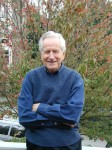John Goodlad, an influential professor, researcher and former dean of UCLA’s Graduate School of Education and Information Studies, died of cancer on Nov. 29 in Seattle. He was 94.
Goodlad is noted across the nation for his contributions to reforming the education system at the primary and university levels. He was also known by co-workers and friends for his charismatic leadership style and welcoming personality.
“He was really forward-looking, and he projected that. He was so enthusiastic, to the point where he would lift himself up on the balls of his feet and the audience would respond to his messages,” said Concepción Valadez, a professor in education hired during the time that Goodlad was dean.“He really projected enthusiasm for being a scholar. He was catching and friendly, but he was serious about the issues at hand.”
His most noted accomplishments include a comprehensive study involving K-12 students in different schools and communities across the country.
The study’s findings, published in 1983, were incorporated into his most popular book, “A Place Called School,” which became a reference for the education field, said Marcelo Suárez-Orozco, current dean of the Graduate School of Education and Information Studies.
“‘A Place Called School’ was a book that had an impact in policy circles but at the same time anticipated many of the (future) fundamental themes in education,” he said.
Goodlad began his career in education in British Columbia, Canada, teaching in a rural, one-room school. He went on to become president of the Institute for Educational Inquiry and taught at several universities including the University of Chicago and the University of Washington.
Valadez said Goodlad focused on the idea of ungraded education and the limitations of traditional teaching methods.
Prior to becoming dean, Goodlad was able to put the theories he developed into practice in the UCLA Lab School. At the university’s experimental elementary school, he taught a classroom where students were separated into different groups based on their academic development instead of age, Valadez said.
When she was newly hired at UCLA, Valadez said Goodlad made her feel welcome and supported her teaching methods.
“I came in with the notion of teaching using students’ home language and background, using examples that would be meaningful and engaging to them,” Valadez said.
Because of his energy and interest in putting his theories into practice, Goodlad spent his time in Los Angeles and across the country giving speeches and visiting schools, not confining himself to paperwork, said Professor Emeritus John McNeil.
McNeil said he attributes the success and innovations of the school of education, now the Graduate School of Education and Information Studies, to Goodlad.
Though there was controversy surrounding the school of education’s transitioning to incorporating research, Goodlad confronted the tension and controversy well, he said.
“He had to bring a new system and confront established professors that were resistant to changing their way of doing things,” McNeil said. “Goodlad was characterized by change, affecting both UCLA and education on a broad level.”
Under his leadership, the school of education also established its first minority opportunity fellowship, which sought to integrate black, Latino and other minority students to doctoral and master’s programs, said Sol Cohen, an assistant professor at the time Goodlad was dean.
Stephen Goodlad, his son, said he began to see his father’s talent and dedication for education after seeing him work for the first time with colleagues at a conference about school curricula in Europe.
“He was one of those rare people who wound up in a profession in which he really believed, and it gave him immense personal rewards,” he said.
McNeil said he thinks Goodlad not only was an influential leader but also had an aesthetic taste that was evident in his style.
“He was an elegant man, dressed in the latest fashion and was very friendly,” McNeil said. “He made you feel his warmth and had an elegance in his style, his office and everything he came in contact with.”
In his free time, Goodlad practiced several activities like swimming, archery and fishing with Stephen Goodlad. His son said that for much of his childhood, he thought of his father as a fisherman more than an educator.
“The last 25 years, there haven’t been any fish,” Stephen Goodlad said with a laugh. “They had really just been special occasions to go out and spend a few hours eating sandwiches, chatting and driving along in the water. He was a great companion and conversant.”
